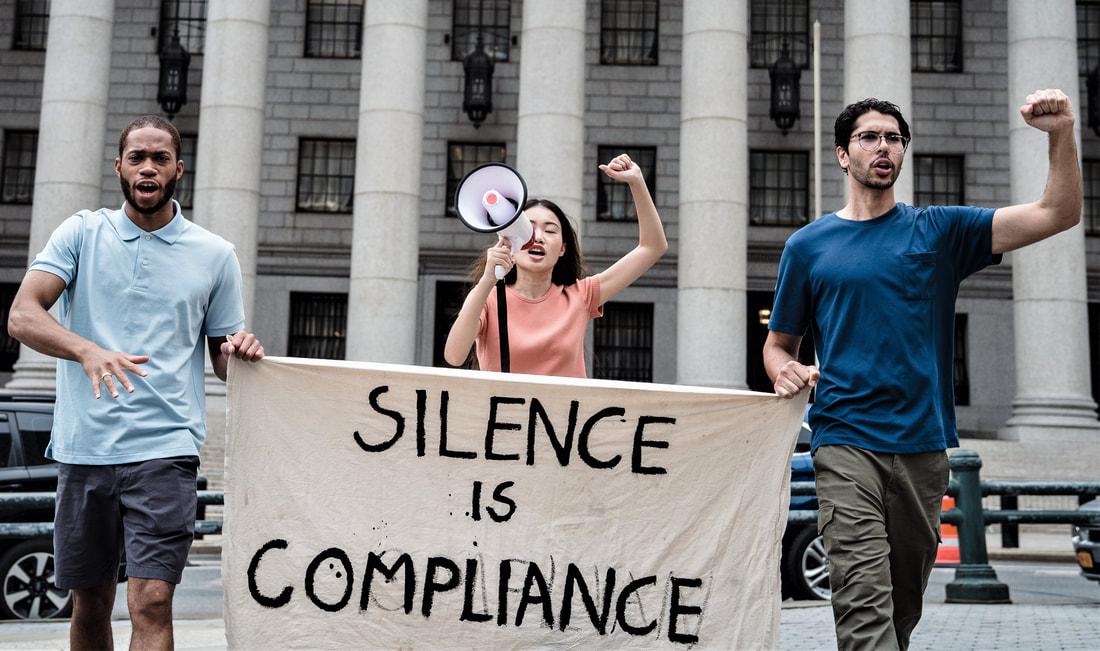|
That was a scary moment. My Dad had developed a dangerous arrhythmia and drastic action was needed to save his life. Paradoxically, the solution lay in stopping his heart. After what felt like a breathtakingly-long pause, the cardiologist restarted his heart to re-establish a healthy rhythm. Thank God it worked and we could all breathe again. More recently, my laptop got into a mess. It was operating so slowly and experiencing so many glitches that I wondered if I needed to replace it. An IT trainer friend, Rob, had a look and discovered that, for some time, I had been closing the lid to power it down, rather than turning it off-and-on again to reboot it. He restarted it and then it worked. A teacher friend, Kathrin, commented that people professionals who deal with challenging relationships, complex issues and wicked problems can get into a tangle too. Over time, it can feel harder to see the wood for the trees, a bit like having pressed on day-after-day without sleep. If you're feeling stressed or burned out, you need a restart. Curious to discover how I can help? Get in touch!
14 Comments
'Growth occurs when individuals confront problems, struggle to master them, and through that struggle develop new aspects of their skills, capacities and views of life.' (Carl Rogers) A common consideration we face in coaching and action learning is, when asking a question, whom the question – or indeed the answer to the question – is for. For instance, if a person is describing a scenario in sketchy terms, we may be tempted to ask them to say more about it so that we have a better picture of the situation they have in mind. If they use jargon or acronyms with which we are unfamiliar, we may ask them to explain what they mean in order to fill our information gaps. If you work in a job such as a manager, professional or consultant, this approach to asking questions may sound and feel very familiar to you. It’s probable that you are employed in such a role because you’re an expert in your field and are able, therefore, to contribute. It may be that others come to you with tricky problems in the hope that you can solve them for them. It’s likely that you will ask questions that help ensure you’re able to offer an appropriate diagnosis, prescription or solution. Now turn this on its head. In coaching and action learning, I don’t need to know very much at all about a situation another person is talking about. My role is to help them to explore fresh avenues of thought and experience for themselves, in order to find or create their own innovative solutions. When I present this idea in training workshops, however, I often see participants look back at me with scepticism. ‘How are we supposed to pose useful questions if we don’t know anything?’ In one such workshop this week, I invited a group of online participants to engage in a simple experiment with me. I asked them to pay close attention, while I described a real challenge I’m dealing with. Before I began to say anything more about the issue itself, however, I turned off my microphone. Then, after a few minutes of speaking, I turned on my microphone again and asked them what questions they could now pose to help me think through my own issue more broadly or deeply. It was a lightbulb moment. After a few moments of silence, questions began to emerge. ‘Which aspect of this matters most to you?’ ‘If you were to be successful in moving ahead with this, what would that look like?’ ‘Which part of this is causing you greatest anxiety or concern?’ I then turned off the microphone again and spoke further. A few minutes later, microphone back on again…then another invitation for questions. The group paused again, then posed further questions to me. ‘Where are you at now in relation to your thinking about this?’ ‘How will you know if you have landed on the right decision?’ ‘What support will you need to move this forward?’ It was a powerful moment of realisation. As we reviewed together what had happened, some profound group insights emerged. ‘We didn’t get drawn into the issue with you because we didn’t know what you were talking about.’ ‘Our questions focused on you in relation to the issue, rather than on the issue itself.’ The client is the expert. My role is to help develop, release and apply that expertise to influence change. Curious to discover how I can help? Get in touch! ‘Just ask the question.’ (Sonja Antell) A key skill in coaching and action learning is simply to pose a question. Adding pre-amble before a question, or post-amble (as one action learning participant aptly named it this week) afterwards, is one way of establishing rapport and sometimes credibility by adding background and context to a question. We may hope, too, to communicate empathy and soften the hardness that a short, succinct question alone could convey. Here’s an example of pre-amble: ‘I can identify well with the situation you are describing today. I’ve been in similar situations too and it reminds me of some of the challenges that I faced then. Given that experience, if I were to ask you a question now, I think I might ask…’ And of post-amble: ‘The reason for my asking this question is that sometimes people in the kind of situation you have described find it useful to consider…’ That’s OK, right? Yet imagine this. The person who is being coached, or the person presenting during action learning, is often engaged in an intense thinking journey, grappling internally with a challenge or struggle and seeking to make sense of it in order to move forward. A simple question can feel like a useful, light-touch nudge, a prompt, a possibility. Pre- or post-amble can distract the person, feel like interference and disrupt the flow. So how to handle the relational and cultural risks of being too direct? How to avoid coming across as abrupt or rude? This is best addressed at the contracting and ground rules-setting stage. Helpful key questions to reach clarity and agreement from the outset include, ‘What are we here to do?’ and ‘How shall we do this?’ Then, as we step back periodically to review our work together, ‘What are we doing well?’ and ‘Even better if..?’ [See also: Claire Pedrick: Simplifying Coaching (2020)] ‘Collusion arises when the coach is only asking questions in a supportive fashion, being non-judgemental and listening, aligning with the other's worldview and failing to challenge or give feedback from a different perspective.' (John Blakey & Ian Day) In those days, we called it non-managerial supervision. These days, we’d call it coaching. My job involved meeting monthly with individuals who had been long-term unemployed. They were on placement, now, in a diverse range of community-based projects throughout London. The idea was to help participants discover and create the necessary confidence, competence and credibility to get paid employment. Some were supported with college training. All had the opportunity to gain valuable real-work experience. Sonja was a young black woman, a single parent on placement as a classroom assistant in a local community school. I loved her bright spirit and admired her remarkable resilience in the face of the many life challenges she faced. Every time we met, I would try to affirm and encourage her. I had been unemployed and I knew some of the psychological and emotional difficulties it could cause. My coaching focused on support, hoping it would help her to continue to persevere and, through that, to flourish in her future. Six months into Sonja’s one-year placement, we reviewed our sessions together: what was working well and what would most improve them as we moved forward. To my great surprise, Sonja challenged me to be more challenging: ‘Most mornings, I arrive at the school late. When I tell you it’s because I’m a single parent and it takes longer than I expect to get my kids ready before work, you accept my reasons and empathise with me. Yet, if I’m to get a job, I need to learn to stop making excuses and to get a grip on my life.’ I felt speechless, and yet this turned out to be a critical turning point in my coaching practice. Ana Karakusevic expresses this well: ‘If you equate listening with being silent, not disrupting the status quo, not interrupting another person’s monologue, not challenging their view of the world ...you’re not ready to be a coach.’ I read resources, including William Glasser’s provocative Reality Therapy, and shifted the balance and orientation of my coaching to offer challenge from a base of support. It transformed everything. ‘I raise up my voice – not so that I can shout, but so that those without a voice can be heard.’ (Malala Yousafzai) I once had a secret meeting with the political wing of a revolutionary group from Central America, in a dark basement flat in London. But my story doesn’t start there. This was my moment. As I flicked through the pages of a UK newspaper, an article leapt out at me about the brutal civil war in El Salvador. I don’t think I’d heard of El Salvador before yet it reminded me of accounts I had read of horrific atrocities committed by the Nazis in WW2. I couldn’t change that terrible history but I could do something now. I quickly did some research then set to work straight away, creating flyers and posters and circulating and sticking them up anywhere I could think of, hoping to raise awareness and to spur others into action too. I talked incessantly to family, friends and colleagues about what was happening in El Salvador. Most responded with a bemused look: ‘Why get so wound up about a situation on the opposite side of the world and over which we have no control anyway?’ That didn’t deter me. It was my time to speak. I heard of a demonstration for El Salvador in London so I went there with a friend, both wearing our anti-war combat jackets. On arrival, we were approached by the organisers and invited to carry a banner. To our surprise, they asked us to march at the very front, directly behind a row of children who were carrying a banner too. Some 20,000 people assembled behind us. We raised our voices in safety – while human rights activists in El Salvador were having their throats cut and their bodies dumped onto the streets. Driven increasingly by vicarious trauma, I joined the El Salvador Committee for Human Rights, a team of 3 activists based in a small room, armed only with a manual typewriter. I had the privilege of volunteering alongside a humble legend, Mike Gatehouse, who had previously been captured and held by the military in Chile during the violent coup that had overthrown its democratically-elected government. My role now was to hitch-hike around the UK, encouraging and resourcing local activist groups to amplify their voice. As I look back, I realise that I didn’t have sufficient personal resilience to handle the stress, and I came close to burnout. My efforts were driven more by pain, empathy and instinct than by strategy and I’ve learned, since, the critical value of supervision. Yet Greenpeace’s profound slogan expressed our motivations too: ‘The optimism of the action is better than the pessimism of the thought.’ There are situations in which we have to act, not because we have any guarantee of success, but because somebody has to speak. [See also: Revolution; Protest; Words; Smoke; Nika; I did try] ‘How can we make the snakes feel safe?’ The power of metaphor. Last week I worked with a group of trauma-informed practice experts. We were thinking about leading and influencing change in dynamically-complex relational systems such as teams and organisations. I shared the image of a snakes-and-ladders game board as a way both of depicting the realities of such change experiences and as a way of managing expectations. Whilst playing with possible meanings for the snakes, the ladders and the game as a whole, we explored how, at times, those people or groups we may view as passive, blocking or undermining vis a vis our own plans may be acting out of anxiety. I was reminded of Richard Young’s two key questions in the organisation development (OD) arena: ‘Where's the power and how is it exercised?’ ‘Where's the anxiety and how does it manifest itself?’ In my experience, we may discover anxiety in all dimensions of human systems. Take, for instance, the leader who is feeling pressured by multiple tasks and demands and worried that the well-meaning initiative you are proposing will be the straw that breaks the camel’s back. Or the team member who is worried that the change you are advocating will increase her responsibilities and leave her feeling inadequate, deskilled or exhausted. I worked with a new senior leader who, in our monthly meetings, would ask me lots of very detailed financial questions. I found it time-consuming and stressful because, although I felt confident in managing my budget, I wasn’t used to reporting at such micro levels. Over time, I began to wonder if I might inadvertently have started to represent a snake in his system…and he in mine. At our next meeting, I asked what he would need from me to give him sufficient trust and confidence in my financial management that I wouldn’t need to report like this in subsequent months. He said: ‘If you were to report using financial language.’ I discovered that, as a Finance Director by background and accountable for my area at Executive level, my limited use of financial language had evoked anxiety in him that I may not have a grip on my team’s finances. I spoke with Finance, expanded my lexicon, reported briefly using his language at the next meeting – and we never returned to micro detail again. The principle here was to approach the person and the issue in an open spirit of curiosity, explore respective needs, identify tangible solutions, and apply them to practice. We both transformed from snakes into ladders and our relationship grew from strength to strength. ‘It is always much more difficult to sing when the audience has turned its back.’ (Calvin Miller) Early in my career, I worked for an over-zealous manager who would sit at the front while I was speaking at events; looking impatient, rolling her hands and tapping her watch. Perhaps she was worrying, unnecessarily, whether I would keep to time. I imagine she thought she was being helpful. I learned then that a look of disapproval or distrust is sometimes all it takes to sap a person’s confidence or to ruin their performance. An Australian pop group reflected a similar feeling and impact in its half-pleading song lyric, ‘I can't do well when I think you're going to leave me, even though I try’. (Empire of the Sun) What a stark contrast a word of encouragement can be. Some years later, I was invited to speak at a prestigious international conference. I had grown in confidence, yet there was something about this event that evoked all kinds of anxieties within me. As I sat alone in the VIP lounge beforehand, I could see my hand trembling uncontrollably as I tried hard to hold a hot drink. When I stepped nervously into the auditorium and onto its expansive, spot-lit stage, I could see smartly-dressed delegates being ushered into the room and handed very professional-looking folders as they looked to find a seat. My legs felt like jelly, so I sat down on the steps beside the podium and took deep breaths to try to relax myself. At that moment, a tiny black woman walked directly up to me and smiled brightly. She announced enthusiastically that she has travelled all the way from the Solomon Islands to be here, and was surprised and delighted to read in the brochure that I too was a ‘follower of Jesus’. I thanked her warmly for introducing herself. Her face shone like an angel. ‘I will be sitting in the centre of the room’, she said, ‘and praying for you continually!’ My knees found strength. The speech went well. When have you felt encouraged at work? How did affect your performance? ‘How is that human systems seem so naturally to gravitate away from their humanness, so that we find ourselves constantly needing to pull them back again?’ (Jenny Cave-Jones) What a profound insight and question. How is that, in organisations, the human so often becomes alien? Images from the Terminator come to mind – an apocalyptic vision of machines that turn violently against the humans that created them. I was invited to meet with the leadership team of a non-governmental organisation (NGO) in East Africa that, in its earnest desire to ensure a positive impact in the lives of the poor, had built a bureaucratic infrastructure that, paradoxically, drained its life and resources away from the poor. The challenge and solution were to rediscover the human. I worked with a global NGO that determined to strengthen its accountability to its funders. It introduced sophisticated log frames and complex reporting mechanisms for its partners in the field, intended to ensure value for its supporters and tangible, measurable evidence of positive impact for people and communities. As an unintended consequence, field staff spent inordinate amounts of time away from their intended beneficiaries, completing forms to satisfy what felt, for them, like the insatiable demands of a machine. The challenge and solution were to rediscover the human. A high school in the UK invited me to help its leaders manage its new performance process which had run into difficulties. Its primary focus had been on policies, systems and forms – intended positively to ensure fairness and consistency – yet had left staff feeling alienated, frustrated and demoralised. We shifted the focus towards deeper spiritual-existential questions of hopes, values and agency then worked with groups to prioritise high quality and meaningful relationships and conversations over forms, meetings and procedures. The challenge and solution were to rediscover the human. Academics and managers at a university for the poor in South-East Asia had competing roles and priorities, and this had created significant tensions as well as affected adversely the learning experience of its students. The parties had attempted unsuccessfully to resolve these issues by political-structural means; jostling behind the scenes for positions of hierarchical influence and power. They invited me in and we conducted an appreciative inquiry together, focusing on shared hopes, deep values, fresh vision and a co-created future. The challenge and solution were to rediscover the human. Where have you seen or experienced a drift away from the human? Curious to discover how I can help? Get in touch! 'Come and live among the poor for a time, and realise what a struggle for existence really means.' (Dr. Selena Fox) When I arrived at a Palestinian hospital to offer myself as a volunteer, the Director looked at me – this young man with long blond hair and a dangly, silver cross earring – with undisguised scepticism. Another volunteer, from Germany, offered to show me around. We sat together on a balcony with hot sun burning down and wasps buzzing around us, to give food to children with severe disabilities. I was just 22, yet I had a mysterious sense that this place, Bethany (literally 'house of the poor' (בֵּית-עַנְיָה)), a stone’s throw from Jerusalem, was where God wanted me to be. That night, I stayed on a dirty mattress on a classroom floor. The drains flooded and spewed raw sewage into the room. As time passed by, I learned to jump back less when I pulled sheets out of a cupboard and saw and heard cockroaches fall and scatter all around my feet. I tried very hard to ignore (ugh!) the huge black spiders that slept in corners where the classroom walls joined the ceilings. I started to get used to the sporadic on-off electricity and water supplies. I began not to notice the stench of classrooms where incontinent children had laid on torn mattresses all day, and we had no soap or disinfectant to clean them. (It was the same mattresses on which we slept). I learned to mask my disappointment when we got to the end of a hard-working day, only to discover that no food had been delivered. When air force jets flew over at low altitude, creating a loud and unnerving sonic boom, even that became part of daily life. I no longer threw myself onto the floor with my hands over my head as the doors and windows rattled. I struggled when I heard nurses tell stories of how they had been treated by military patrols. I was horrified when I met a 17 year old girl hiding in the kitchen because she had been seen talking to a man in the street who wasn’t a relative. Her own family was hunting her down to kill her – to restore their “honour”. I felt mortified when nurses stepped over and ignored a man with cerebral palsy who had fallen out of his wheelchair in the corridor, “because he’s a Syrian”. I was sometimes shocked by well-meaning nurses’ lack of basic training, such as when they gave out random, out-of-date medication (usually donated with labels in English that they couldn’t read) because, “medicines help people”. Yet, deep down, I admired these amazing people, working so hard in such harsh conditions. Most welcomed and accepted me as a foreigner, no matter how cross-culturally naïve and painfully out of my depth I was. I always remember that remarkable volunteer who put me to shame by his amazing love and example. I will never forget the nurses who crowded into a sherut when I left, clinging to me and crying unashamedly as I fought back my own tears. You arrange to meet with a colleague and, on the afternoon of the appointment, she neither turns up nor cancels it. It can feel disappointing or frustrating, especially if you had spent ages preparing for it, or had rescheduled other things to make room for her in your diary. There may be, of course, all kinds of extenuating circumstances that had prevented her from arriving or letting you know. We could imagine, for instance, that her car had broken down on route, or that she had got stuck in traffic in an area with no mobile phone signal. She might have been held up in another meeting that overran and from which, for whatever reason, she had felt unable to excuse herself. Feelings of hurt or resentment can arise, however, if we allow ourselves to infer deeper meaning and significance from the no show. This can be especially so if it forms part of a wider and repeated pattern of experiences. Could it be, for instance, that her unexpected absence (again) is revealing a subtle and subliminal message such as, ‘Spending time on A is more important to me than spending time with you on B.’ Or, beneath that, ‘I believe my work on A is more important than your work on B’. Or deeper and worse still, perhaps, ‘I’m more important than you.’ The latter could well leave us feeling devalued and disrespected and, if unresolved, damage the relationship itself. I worked with one leader, Mike, who modelled remarkable countercultural behaviour in this respect. If Mike were in a meeting that looked like it may need to overrun, he would: (a) pause the meeting briefly (irrespective of how ‘senior’ or ‘important’ the person was whom he was with); (b) speak with whomever he was due to meet with next (irrespective of how ‘junior’ or ‘unimportant’ that person was); (c) check if it would be OK with them to start their meeting later or, if needed, to defer it; and (d) take personal responsibility to resolve any implications that may arise from that rescheduling. Needless to say, Mike’s integrity and respect earned him huge loyalty, admiration and trust. When have you seen great models of personal leadership? How do you deal with a no show? |
Nick WrightI'm a psychological coach, trainer and OD consultant. Curious to discover how can I help you? Get in touch! Like what you read? Simply enter your email address below to receive regular blog updates!
|













 RSS Feed
RSS Feed